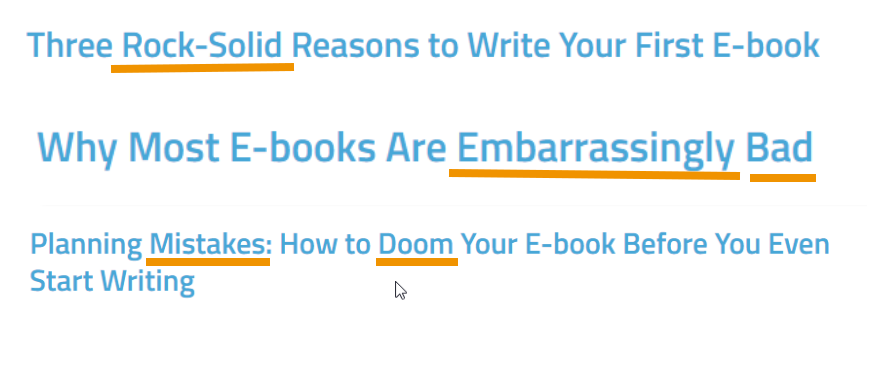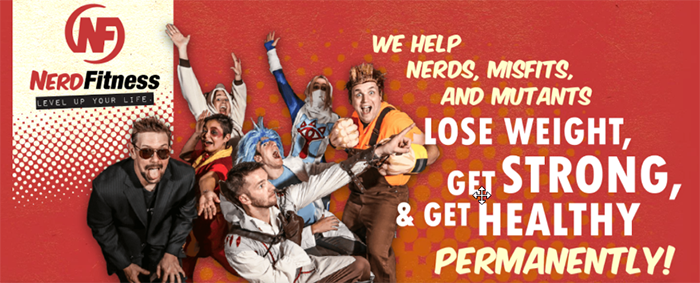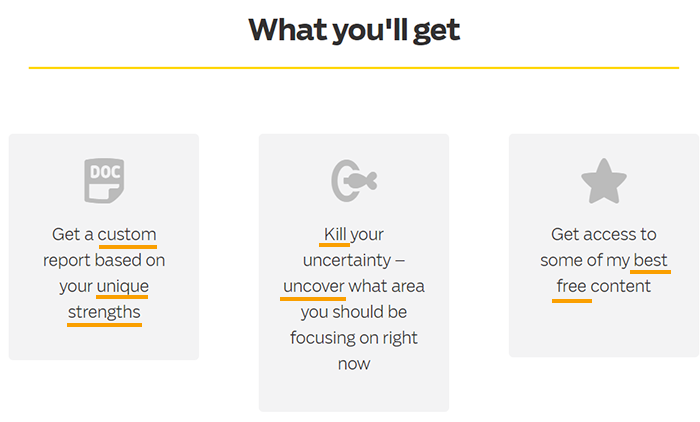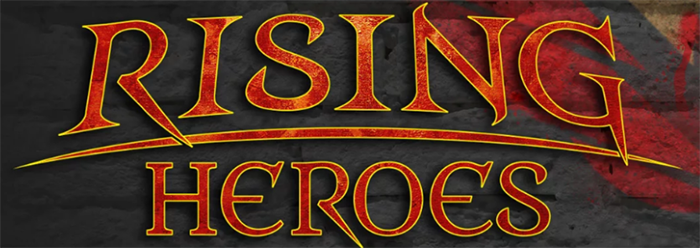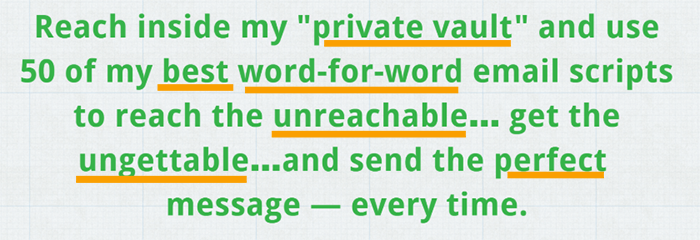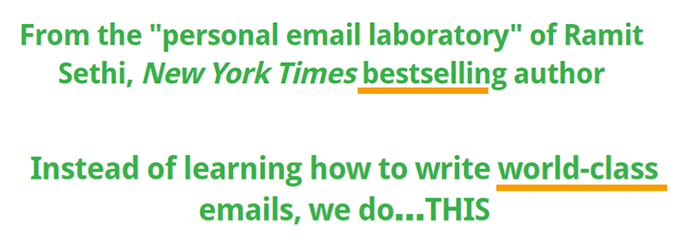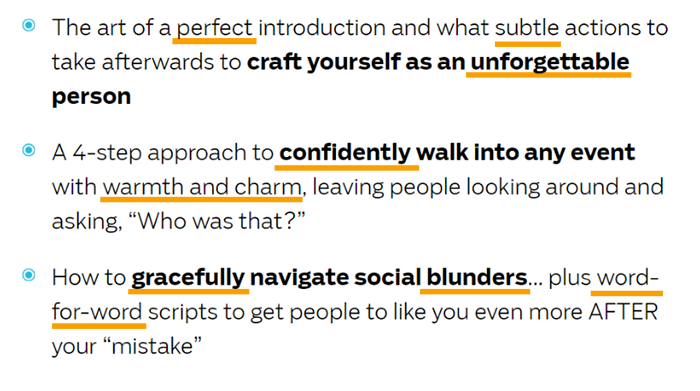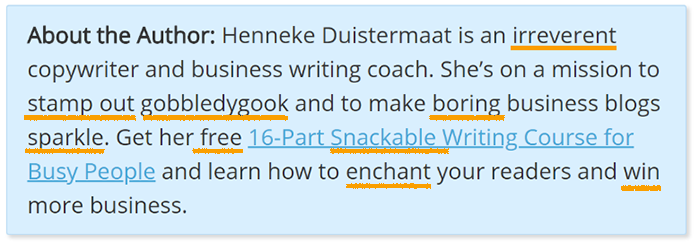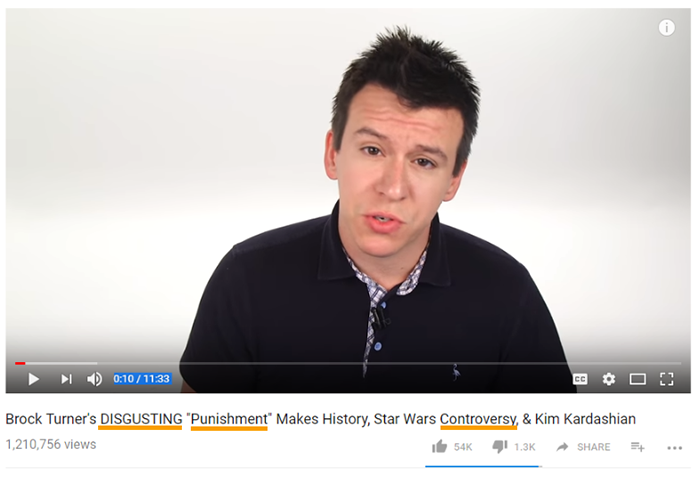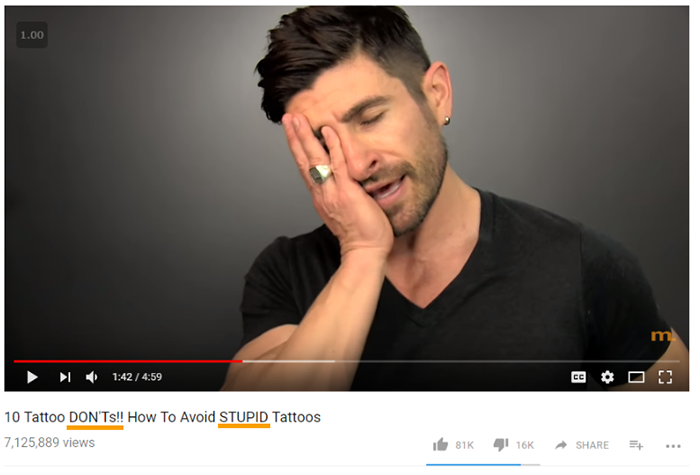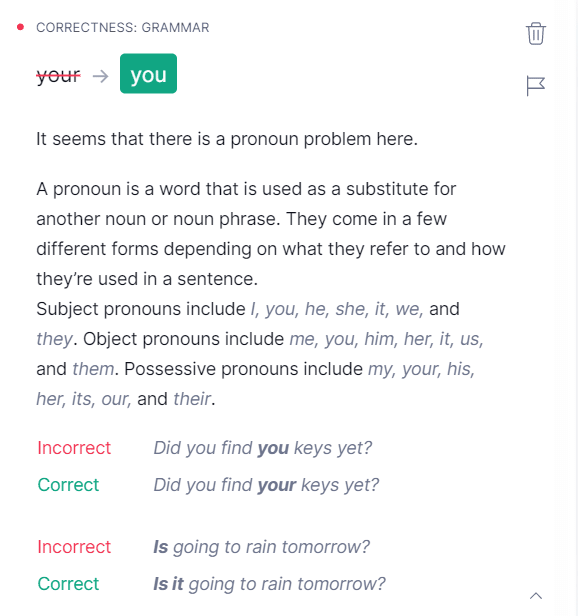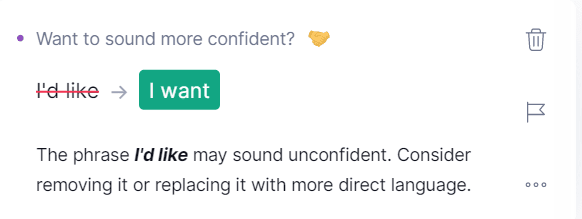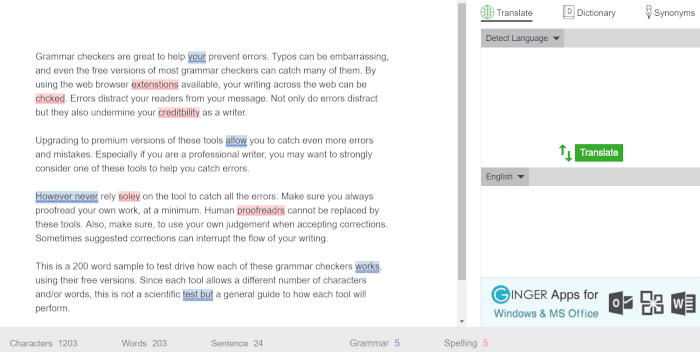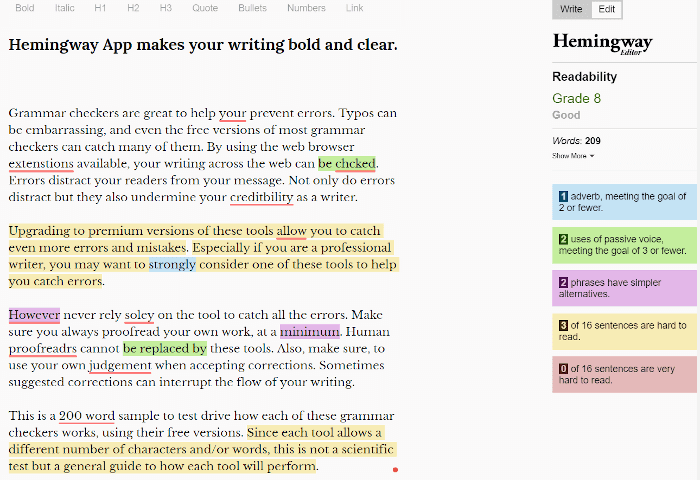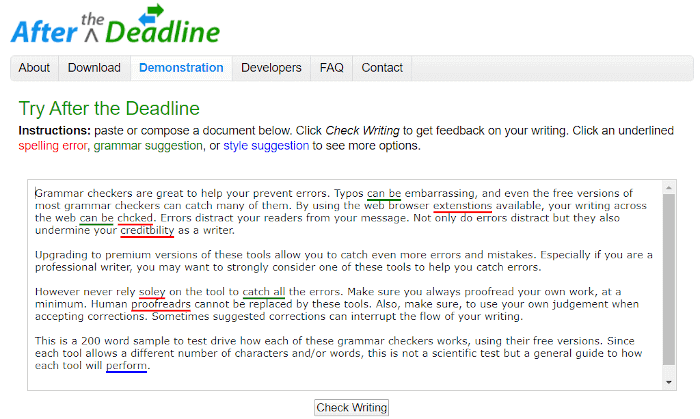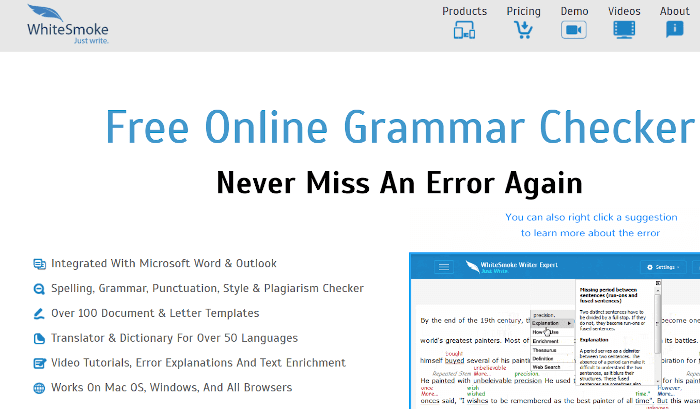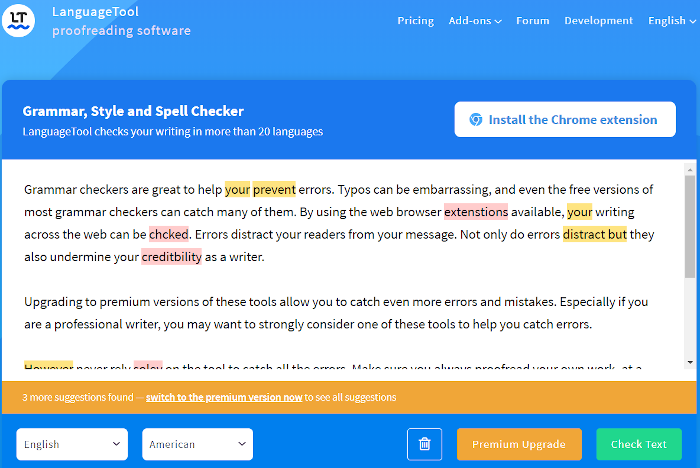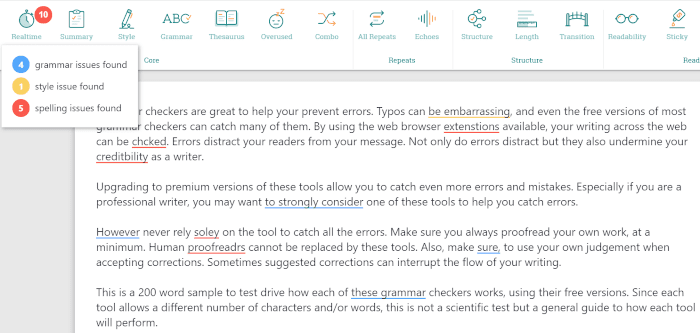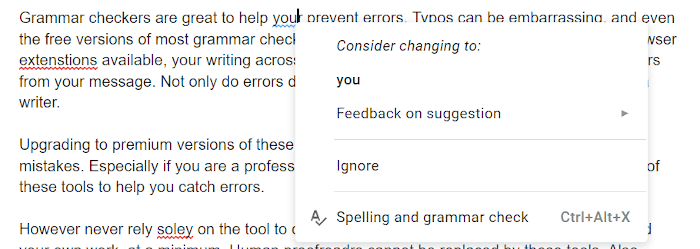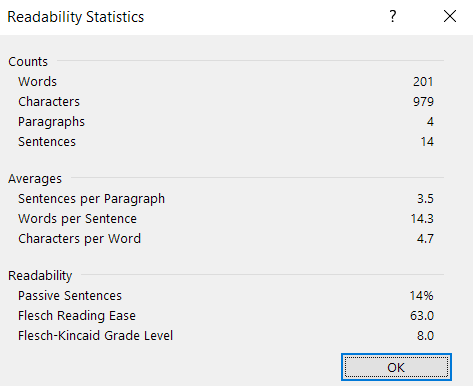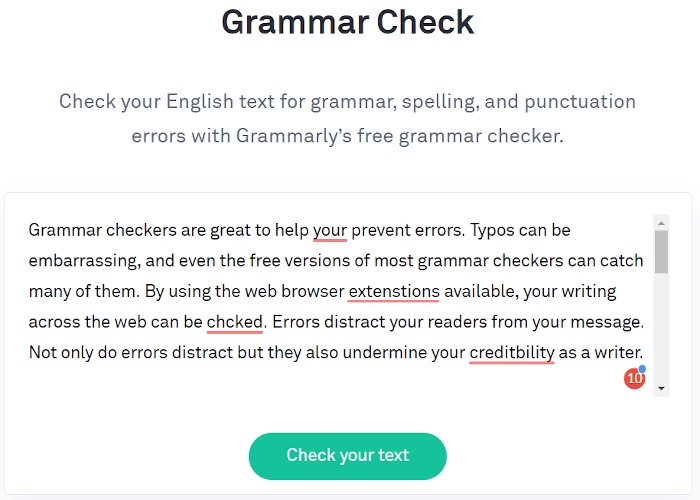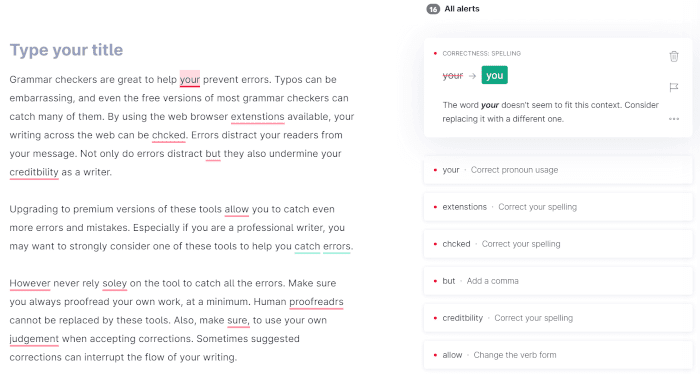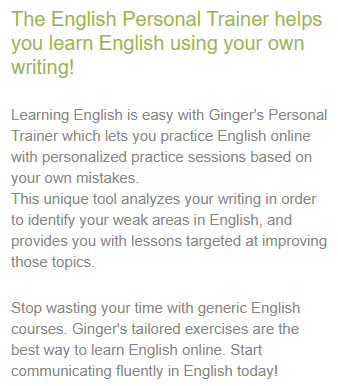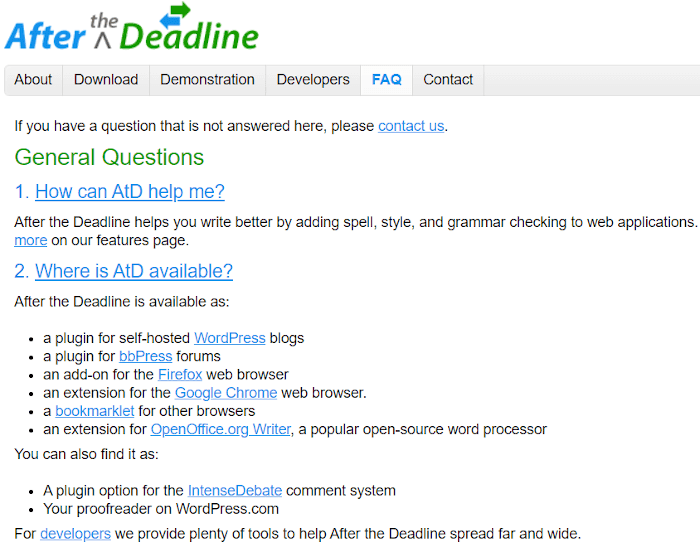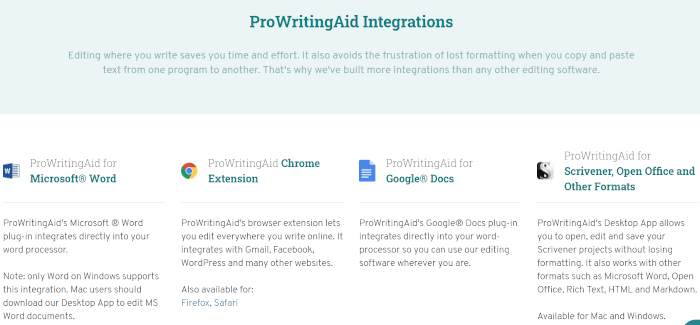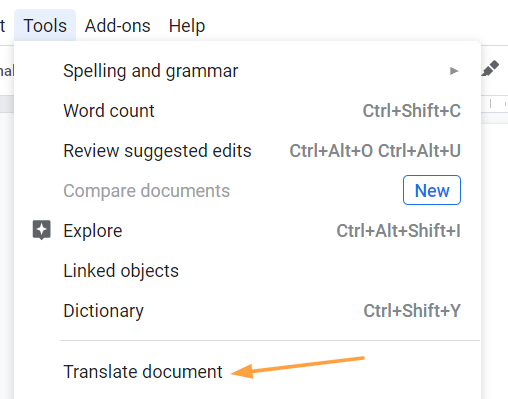Power words are like a “cheat code” for boosting conversion rates. Sprinkle in a few, and you can transform dull, lifeless words into persuasive words that compel readers to take action.
And the best part:
You can use them anywhere.
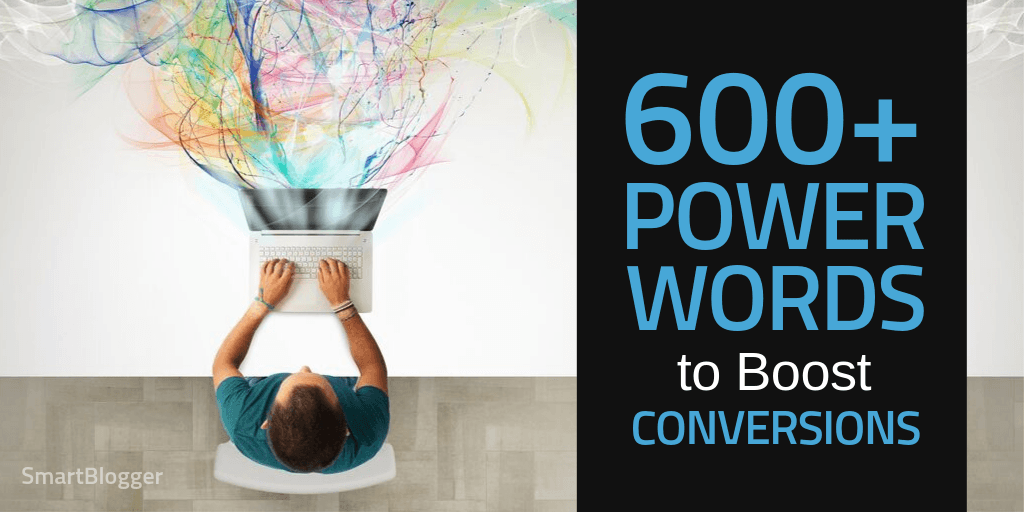
In this post, you’ll learn how to use power words like a kung fu master. Specifically:
- The definition of power words (and why they’re so powerful);
- The 7 types of power words proven to increase conversions;
- Examples of how bloggers, writers, and businesses are using power words to boost conversions;
- 600+ powerful words you can use, bookmark, and reference (again and again).
Let’s jump in.
What are Power Words?
Power words are persuasive, descriptive words that trigger a positive or negative emotional response. They can make us feel scared, encouraged, aroused, angry, greedy, safe, or curious. Authors, copywriters, and content marketers use “power words” to spice up their content and compel audiences to take action.
Clear as mud?
Let’s deconstruct an example from the great Winston Churchill. All the power words are underlined:
We have before us an ordeal of the most grievous kind. We have before us many, many long months of struggle and of suffering. You ask, what is our policy? I can say: It is to wage war, by sea, land and air, with all our might and with all the strength that God can give us; to wage war against a monstrous tyranny, never surpassed in the dark, lamentable catalogue of human crime. That is our policy. You ask, what is our aim? I can answer in one word: It is victory, victory at all costs, victory in spite of all terror, victory, however long and hard the road may be; for without victory, there is no survival.
Inspiring, right?
Well, there was a lot on the line. Under attack from Germany, Britain was fighting for its survival, and somehow, someway, Churchill had to find a way to inspire his countrymen to greatness.
He chose words. Or, to be more accurate, power words.
Each underlined word makes the audience feel something.
In this case, Churchill intermixes words that cause fear, such as “struggle,” “tyranny,” and “terror,” with words that cause hope, such as “strength,” “God,” and “victory.” The last, in particular, is repeated over and over, practically drilling the emotion into the minds of the audience.
It’s no accident.
Power Words = Emotional Words Packed with Persuasion
Smart speakers, as well as their speechwriters, sprinkle their speeches with carefully-chosen power words drenched in sensory details, drawing the audience from one emotion to another as skillfully as any novelist or screenwriter.
And it goes beyond speakers and storytellers.
Email marketing messages, resumes, copywriting, blog posts, infographics, step-by-step tutorials, sales copy, inspirational quotes, content marketing, and proposals are all designed to influence the reader in some way. You want to pass along information, yes, but you also want the reader to feel a certain way about that information.
Maybe you want to impress them, get them excited, make them cautious, get them angry, encourage them to keep going, or any number of emotions. The better a job you do at making them feel, the more influential you are, and the better your chances of getting what you want.
So…
Looking for a quick way to give your writing more punch?
Maybe add a little personality or pizzazz — that extra little “oomph” that makes your reader pay attention?
Want to bring your ideas to life, to make them take up residence in the mind of the reader, lurking in the background, tugging, pulling, and cajoling their emotions until they think and feel exactly as you want?
Then you need to infuse your content with power words.
The 7 Different Types of Power Words
- Fear Power Words
- Encouragement Power Words
- Lust Power Words
- Anger Power Words
- Greed Power Words
- Safety Power Words
- Forbidden Power Words
We’ve organized our power words into seven different types, which all accomplish the same goal: Each elicits emotion in your reader.
Let’s go over each type and see why these words work.
1. Fear Power Words
Let’s do a little experiment.
Just for a moment, stop reading this post, turn on the television, and go to a major news channel. Watch it for five minutes, listening for the words below.
Chances are, you’ll hear dozens of them. Here’s why:
Fear is without a doubt the most powerful emotion for grabbing and keeping an audience’s attention. To make sure you don’t change the channel, news networks load up with fear words, making you worry you might miss something important.
Granted, you can overdo it, but in my opinion, most writers don’t use these types of words nearly enough. They really do connect with people.
How to Crank Up Emotion with Fear Words
Here’s an example of a blog post headline here at Smart Blogger that utilizes three different fear words:
Open it and you’re greeted by this fear-packed introduction:
I was in
agony.
Waves of pain unimaginable shot down my spine, causing every muscle in my body to contract as if I’d been shocked with 20,000 volts of electricity. My back arched up at an unnatural angle. My arms and legs began to shake.
One moment, I was on a webinar talking to a few hundred people about traffic, walking them through exactly how to start a blog and make it popular. The next, everything went dark. I was still conscious, but just barely.
Pretty effective, right?
If you’d like to sprinkle fear power words into your writing, here are a bunch to get you started:
| Agony |
Lunatic |
| Apocalypse |
Lurking |
| Armageddon |
Massacre |
| Assault |
Meltdown |
| Backlash |
Menacing |
| Beating |
Mired |
| Beware |
Mistake |
| Blinded |
Murder |
| Blood |
Nightmare |
| Bloodbath |
Painful |
| Bloodcurdling |
Pale |
| Bloody |
Panic |
| Blunder |
Peril |
| Bomb |
Piranha |
| Buffoon |
Pitfall |
| Bumbling |
Plague |
| Cadaver |
Played |
| Catastrophe |
Plummet |
| Caution |
Plunge |
| Collapse |
Poison |
| Corpse |
Poor |
| Crazy |
Prison |
| Cripple |
Pummel |
| Crisis |
Pus |
| Danger |
Reckoning |
| Dark |
Refugee |
| Deadly |
Revenge |
| Death |
Risky |
| Deceiving |
Scary |
| Destroy |
Scream |
| Devastating |
Searing |
| Disastrous |
Shame |
| Doom |
Shatter |
| Drowning |
Shellacking |
| Dumb |
Shocked |
| Embarrass |
Silly |
| Fail |
Slaughter |
| Feeble |
Slave |
| Fired |
Strangle |
| Fool |
Stupid |
| Fooled |
Suicide |
| Frantic |
Tailspin |
| Frightening |
Tank |
| Gambling |
Targeted |
| Gullible |
Teetering |
| Hack |
Terror |
| Hazardous |
Terrorist |
| Hoax |
Torture |
| Holocaust |
Toxic |
| Horrific |
Tragedy |
| Hurricane |
Trap |
| Injure |
Vaporize |
| Insidious |
Victim |
| Invasion |
Volatile |
| IRS |
Vulnerable |
| Jail |
Warning |
| Jeopardy |
Worry |
| Lawsuit |
Wounded |
| Looming |
Cringeworthy |
| Last chance |
Fugacious |
2. Encouragement Power Words
Let’s face it.
When they’re reading, most people aren’t exactly bouncing off the walls with energy and enthusiasm. They’re probably bored, maybe a little depressed, and almost definitely tired.
And they’re looking for something, anything, that’ll wake them up and make them feel better.
The good news?
Your writing can do that for them.
How to Crank Up Emotion with Encouragement Words
Here’s an example email from Mirasee:
With two encouraging words — life-changing and magic — in one subject, it’s an email that stands out in most inboxes.
Want to give your readers a pep talk and get them charged up again? Want to encourage them?
Use these persuasive words:
| Amazing |
Jubilant |
| Ascend |
Legend |
| Astonishing |
Life-changing |
| Astounding |
Magic |
| Audacious |
Marvelous |
| Awe-inspiring |
Master |
| Awesome |
Mind-blowing |
| Backbone |
Miracle |
| Badass |
Miraculous |
| Beat |
Noble |
| Belief |
Perfect |
| Blissful |
Persuade |
| Bravery |
Phenomenal |
| Breathtaking |
Pluck |
| Brilliant |
Power-up |
| Celebrate |
Praise |
| Cheer |
Prevail |
| Colossal |
Remarkable |
| Command |
Revel |
| Conquer |
Rule |
| Courage |
Score |
| Daring |
Seize |
| Defeat |
Sensational |
| Defiance |
Spectacular |
| Delight |
Spine |
| Devoted |
Spirit |
| Dignity |
Splendid |
| Dominate |
Spunk |
| Effortless |
Staggering |
| Empower |
Strengthen |
| Epic |
Striking |
| Excellent |
Strong |
| Excited |
Stunning |
| Extraordinary |
Stunt |
| Eye-opening |
Supreme |
| Fabulous |
Surprising |
| Faith |
Terrific |
| Fantastic |
Thrive |
| Fearless |
Thwart |
| Ferocious |
Titan |
| Fierce |
Tough |
| Force |
Triumph |
| Fulfill |
Tremendous |
| Glorious |
Unbeatable |
| Glory |
Unbelievable |
| Graceful |
Unforgettable |
| Grateful |
Unique |
| Grit |
Unleash |
| Guts |
Uplifting |
| Happy |
Valiant |
| Heart |
Valor |
| Hero |
Vanquish |
| Honor |
Victory |
| Hope |
Win |
| Incredible |
Wonderful |
| Jaw-dropping |
Wondrous |
| Kudos |
Brighten |
| Lovable |
Radiant |
| Flawless |
Classy |
| Affable |
Stupendous |
| Virtuoso |
Cheery |
| Openhearted |
Jovial |
| Beauteous |
Logophile |
3. Lust Power Words
Like it or not, lust is one of the core human emotions.
Just look at the men’s and women’s magazines in the checkout aisle, and you’ll see what I mean. Nearly every headline on the cover is either blatantly or indirectly about sex.
And it works, not just for men’s and women’s magazines, but for anything.
As a writer, you can use words that inspire lust to make almost anything intriguing.
How to Crank Up Emotion with Lust Words
See if you can spot the lust words in this headline from Cosmopolitan:
Okay, the orange underlines probably give it away, but my hunch is you didn’t need them.
Power words like captivating and love jump off the page. And if you use them properly, they can stir all sorts of emotions in your readers’ heads.
Here’s a lascivious list of descriptive words to get you started:
| Allure |
Naughty |
| Arouse |
Nude |
| Bare |
Obscene |
| Begging |
Orgasmic |
| Beguiling |
Passionate |
| Brazen |
Pining |
| Captivating |
Pleasure |
| Charm |
Provocative |
| Cheeky |
Racy |
| Climax |
Raunchy |
| Crave |
Risque |
| Delight |
Rowdy |
| Delirious |
Salacious |
| Depraved |
Satisfy |
| Desire |
Saucy |
| Dirty |
Scandalous |
| Divine |
Seduce |
| Ecstasy |
Seductive |
| Embrace |
Sensual |
| Enchant |
Sex |
| Enthralling |
Shameless |
| Entice |
Sinful |
| Entrance |
Sleazy |
| Excite |
Sleeping |
| Explicit |
Spank |
| Exposed |
Spellbinding |
| Fascinate |
Spicy |
| Forbidden |
Steamy |
| Frisky |
Stimulating |
| Goosebumps |
Strip |
| Hanker |
Sweaty |
| Heavenly |
Tantalizing |
| Hottest |
Taste |
| Hypnotic |
Tawdry |
| Impure |
Tease |
| Indecent |
Tempting |
| Intense |
Thrilling |
| Intoxicating |
Tickle |
| Itching |
Tight |
| Juicy |
Tingle |
| Kinky |
Turn on |
| Kiss |
Unabashed |
| Lascivious |
Uncensored |
| Lewd |
Untamed |
| Lick |
Untouched |
| Lonely |
Urge |
| Longing |
Voluptuous |
| Love |
Vulgar |
| Lure |
Wanton |
| Luscious |
Wet |
| Lush |
Whip |
| Lust |
Wild |
| Mischievous |
X-rated |
| Mouth-watering |
Yearning |
| Naked |
Yummy |
| Sneak peek |
|
4. Anger Power Words
As writers, sometimes our job is to anger people.
Not for the fun of it, mind you, but because someone is doing something wrong, and the community needs to take action to correct it.
The problem is, with wrongdoing, most people are pretty apathetic — they’ll wait until the situation becomes entirely intolerable to do anything, and by then, it’s often too late.
So, we have to fan the flames.
How to Crank Up Emotion with Anger Words
The authors of this Forbes headline don’t pull any punches:
I didn’t realize some people get angry over business jargon, but apparently it’s a thing. And this headline, undoubtedly, had such people frothing at the mouth.
If you want to connect with people’s anger and slowly but surely work them into a frenzy, use the power words below.
Just be careful who you target. Lawyers can eat you alive if you pick on the wrong person. 🙂
| Abhorrent |
Money-grubbing |
| Abuse |
Nasty |
| Annoying |
Nazi |
| Arrogant |
No good |
| Ass kicking |
Obnoxious |
| Backstabbing |
Oppressive |
| Barbaric |
Pain in the ass |
| Bash |
Payback |
| Beat down |
Perverse |
| Big mouth |
Pesky |
| Blatant |
Pest |
| Brutal |
Phony |
| Bullsh*t |
Pissed off |
| Bully |
Pollute |
| Cheat |
Pompous |
| Clobber |
Pound |
| Clown |
Preposterous |
| Cocky |
Pretentious |
| Corrupt |
Punch |
| Coward |
Punish |
| Crooked |
Rampant |
| Crush |
Ravage |
| Curse |
Repelling |
| Debase |
Repugnant |
| Defile |
Revile |
| Delinquent |
Revolting |
| Demolish |
Rotten |
| Desecrate |
Rude |
| Disgusting |
Ruined |
| Dishonest |
Ruthless |
| Distorted |
Savage |
| Evil |
Scam |
| Exploit |
Scold |
| Force-fed |
Sick and tired |
| Foul |
Sink |
| Freaking out |
Slam |
| Full of sh*t |
Slander |
| Greedy |
Slap |
| Gross |
Slay |
| Harass |
Smash |
| Hate |
Smear |
| High and mighty |
Smug |
| Horrid |
Sniveling |
| Infuriating |
Snob |
| Jackass |
Snooty |
| Kick |
Snotty |
| Kill |
Spoil |
| Knock |
Stuck up |
| Knock out |
Suck |
| Know it all |
Terrorize |
| Lies |
Trash |
| Livid |
Trounce |
| Loathsome |
Tyranny |
| Loser |
Underhanded |
| Lying |
Up to here |
| Maul |
Useless |
| Misleading |
Violate |
| Lollygag |
Quixotic |
5. Greed Power Words
The legendary copywriter Gary Halbert once said, “If you want people to buy something, stomp on their greed glands until they bleed.” Graphic, yes, but also true.
Skim through good sales copy, and you’ll find a lot of these power words. Many of them are so overused they’ve become cliché, but that doesn’t stop them from working.
The truth is, nearly every human being on the planet is interested in either saving or making money.
How to Crank Up Emotion with Greed Words
Its explicit and implicit use of greed words makes this popular book from Dave Ramsey a great example:
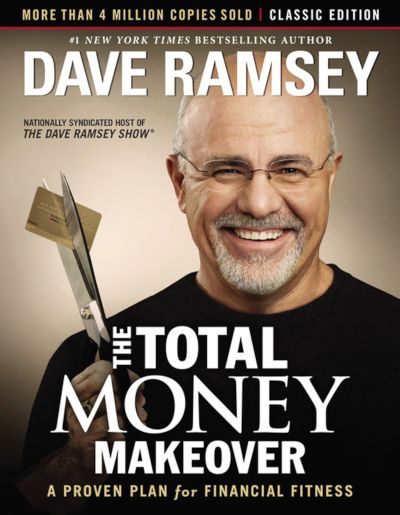
“Money” is hard to miss — it’s probably the ultimate greed word and it’s sitting there in capital letters.
But a title like “Total Money Makeover” also implies another greed word (even though it doesn’t directly state it): money-saving.
(It also gets bonus points for using the safety power word “proven”, which we’ll discuss in a moment.)
If you want to stomp on your readers’ greed glands, use these power words:
| Bank |
Jackpot |
| Bargain |
Lowest price |
| Best |
Luxurious |
| Billion |
Marked down |
| Bonanza |
Massive |
| Booked solid |
Money |
| Cash |
Money-draining |
| Cheap |
Money-saving |
| Costly |
Nest egg |
| Discount |
Pay zero |
| Dollar |
Prize |
| Double |
Profit |
| Explode |
Quadruple |
| Extra |
Reduced |
| Feast |
Rich |
| Fortune |
Savings |
| Free |
Six-figure |
| Freebie |
Skyrocket |
| Frenzy |
Soaring |
| Frugal |
Surge |
| Gift |
Treasure |
| Golden |
Triple |
| Greatest |
Waste |
| High-paying |
Wealth |
| Inexpensive |
Whopping |
6. Safety Power Words
Greed isn’t the only emotion you want buyers to feel. You also want to make them feel safe.
They need to trust both you and your product or service. They need to have confidence you’ll deliver, and they need to believe they’ll get results.
Of course, building that kind of trust starts with having a quality brand and reputation, but the words you use to describe yourself and your product or service also matter.
How to Crank Up Emotion with Safety Words
On the landing page for one of our Smart Blogger courses, we use power words to make sure our customers feel safe:
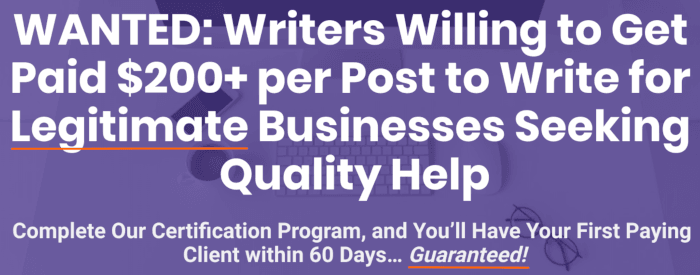
In addition to “legitimate” and “guaranteed” in the screenshot above, our landing page is sprinkled with numerous safety words:
- Money-back
- Results
- Refund
- Proven
- Risk-free
They work for us, and they can work for you.
Help your customers feel safe by using as many of these power words as possible:
| Above and beyond |
Privacy |
| Anonymous |
Professional |
| Authentic |
Protected |
| Automatic |
Proven |
| Backed |
Recession-proof |
| Bankable |
Refund |
| Best-selling |
Reliable |
| Cancel anytime |
Research |
| Certified |
Results |
| Clockwork |
Risk-free |
| Endorsed |
Rock-solid |
| Foolproof |
Science-backed |
| Guaranteed |
Scientific |
| Ironclad |
Secure |
| Legitimate |
Sure-fire |
| Lifetime |
Survive |
| Money-back |
Tested |
| No obligation |
That never fails |
| No questions asked |
Thorough |
| No risk |
Trustworthy |
| No strings attached |
Try before you buy |
| No-fail |
Unconditional |
| Official |
Verify |
| Permanent |
World-class |
| Guilt-free |
|
7. Forbidden Power Words
Remember when you were a kid, and someone told you NOT to do something? From that point on, you could think about little else, right?
The truth is, we’re all fascinated by the mysterious and forbidden. It’s like it’s programmed into our very nature.
So why not tap into that programming?
How to Crank Up Emotion with Forbidden Words
This Ahrefs article tempts you with its headline:
What’s the “secret”? Only one way to find out.
Whenever you want to create curiosity, sprinkle these power words throughout your writing, and readers won’t be able to help being intrigued:
| Ancient |
Lost |
| Backdoor |
Never seen before |
| Banned |
Off the record |
| Behind the scenes |
Off-limits |
| Black Market |
Outlawed |
| Blacklisted |
Private |
| Bootleg |
Restricted |
| Censored |
Sealed |
| Classified |
Secret |
| Cloak and dagger |
Smuggled |
| Concealed |
Strange |
| Confessions |
Tried to hide |
| Confidential |
Unauthorized |
| Controversial |
Uncensored |
| Covert |
Under wraps |
| Cover-up |
Undercover |
| Exotic |
Underground |
| Forbidden |
Under-the-table |
| Forgotten |
Undisclosed |
| From the vault |
Unexpected |
| Hidden |
Unlock |
| Hush-hush |
Unreachable |
| Illegal |
Unspoken |
| Insider |
Unveiled |
| Little-known |
Withheld |
Now that we’ve looked at the different types of power words (and gone over a few quick examples), let’s go over all the different places you can use them:
Powerful Words in Action: 14 Places Where Strong Words Can Help You
- Headlines
- Subheads
- Email Subject Lines
- Opt-In Boxes
- Homepage
- Business Names/Blog Names
- Product Names
- Sales Pages
- Testimonials
- Bullet Lists
- Button Copy (Call to Action)
- Author Bios
- YouTube Videos
- Book Titles
1. Using Power Words in Headlines
Any blogger who’s been in the game for a while knows the headline is the most important part of writing your blog post.
Its purpose, after all, is to entice the reader to read the rest of your content. If your headline fails to get attention, potential readers will ignore it when it shows up in their tweets and social media feeds.
And just one or two power words in your headline is usually enough to make it stand out.
Just look at this headline from BuzzFeed:
The word “Unveiled” makes it feel like a secret is being exposed, and the word “Breathtaking” makes you curious to see what the photo looks like.
Here’s another example from BoredPanda:
People generally love anything adorable, so this headline will easily catch attention. (The fact that it refers to snakes will only make people more curious.)
The headline then drives it home by using the powerful verb “Conquer.”
Here’s one from BrightSide:
While one or two power words are often enough, this headline proves you can use more when it fits.
This headline has four powerful words, but they feel natural in the headline, which keeps it from feeling like over-the-top clickbait.
Last one:
This headline from our How to Make Money Writing: 5 Ways to Get Paid to Write in 2020 post incorporates two greed words: “money” and “get paid.”
It’s one of our most-popular posts, and its headline’s use of power words is a big reason why.
2. Using Power Words in Subheads
Too many writers overlook the value of subheads, which is a mistake. Once people click on your headline, most will scan the post first to see if it looks worthy of their attention.
Adding some power words to your subheads is a good way to make your post look like an interesting read.
For example, here are three subheads from our post on E-book mistakes:
See how the power words in these subheads grab your attention and make you want to read the text that follows?
Adding one or two power words to your subheads will compel readers to stick around longer, which will increase your dwell time — a big deal in Google’s eyes.
3. Using Power Words in Email Subject Lines
Having an email list is of little use if only a handful of readers bother to open your emails.
And these days, most people’s inboxes are flooded, so they’re selective in which emails they open.
You can stand out in their inbox and raise your open rates by including power words in your subject lines.
Just look at this one from Ramit Sethi:
If this subject line would’ve read “The rules of learning,” do you think it would be as appealing? The word “unspoken” is what makes it interesting.
Here’s another one from Cal Fussman:
Both “Triumph” and “Tragedy” are powerful words full of emotion.
And finally, here’s a good example from AppSumo:
The power phrase “Unleash the power” makes you feel this email is hiding something incredibly powerful inside.
See how that works?
When you send out emails to your list, try to add a power word to your subject line so it stands out in readers’ inboxes.
4. Using Power Words in Opt-In Boxes
As a blogger, one of your main goals is to grow a large and engaged readership, and the best way to do it is by converting readers into subscribers.
That means — unless you’re using a blogging platform like Medium which doesn’t allow them — you should have opt-in forms scattered across your website.
You can place them on your homepage, at the end of your posts, in your sidebar, in a popup, or anywhere else.
But no matter where you place them, your opt-in boxes must catch people’s eye and make them want to share their email address with you. Because they won’t give it away to just anyone.
(Remember, their inboxes are already flooded, so they’re not necessarily eager to get even more emails.)
Fortunately, you can use power words to make your offer more enticing.
As an example, here’s an old popup from Cosmopolitan:
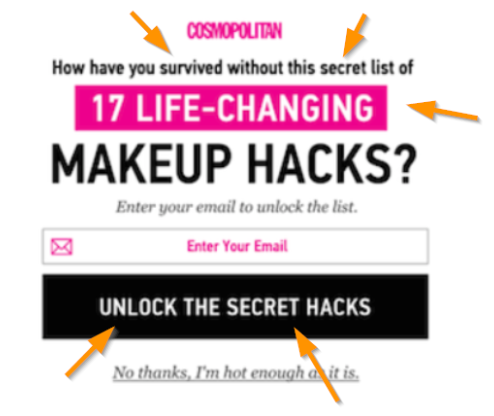
This popup had power words everywhere, but it avoided feeling like overkill. I bet it converted like crazy.
Here’s a slightly more subtle example from Betty Means Business:
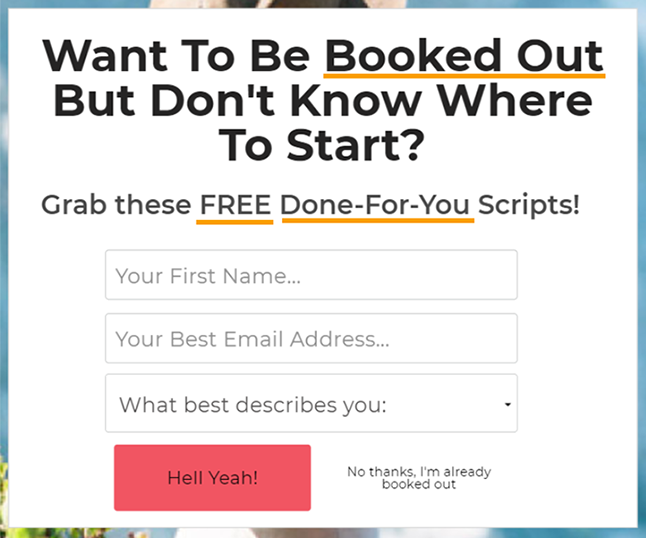
It’s understated, but still quite effective.
Again, you don’t have to overdo it with the power words on these. A little can go a long way.
Here’s one final example from Renegade Planner:
In short:
If you’re not using power words in your opt-in boxes, you’re missing out.
Big time.
5. Using Power Words on Your Homepage
Your homepage is the face of your website and it’s usually one of the most visited pages. Many people who visit your website will see this page first, so you want it to make a good first impression.
Some people use their homepage to promote their email list, others use it to promote one of their products, and others use it as a red carpet — welcoming new visitors and explaining what their site is all about.
In any case, your homepage is a good spot to add a few power words, as it can determine whether people stay (and take the action you want them to take) or leave (never to return).
Look at this value proposition on the homepage for Nerd Fitness:
“Nerds,” “Misfits,” and “Mutants” are unusual power words that work well for the audience Nerd Fitness is targeting. These words immediately separate it from all the other fitness blogs out there.
But they push it even further with “Strong,” “Healthy,” and “Permanently.”
Here’s another value proposition from MainStreetHost’s homepage:
It’s quite minimal, isn’t it? They just wrote down three power words and follow it up with a service they provide.
Of course, you don’t have to limit your use of power words to the top of your homepage.
You can use it in other parts of the homepage too, as Ramit Sethi does here in his list of what you’ll get when you sign up for his email list:
Go look at your homepage now and see if you can find any areas you can spruce up with some power words.
6. Using Power Words in Business Names/Blog Names
Having a forgettable name is poison to your website’s growth. So when you start a blog, you want to make sure you have a name people can easily recall.
If you haven’t chosen your blog name yet (or if you’re thinking about rebranding), you should use a power word to give it some punch. It’ll make you stand out from all the boring, forgettable brands out there.
Just take a look at the collection of blog names below and see how well they’ve incorporated power words:
7. Using Power Words in Product Names
Just like you can use power words to spruce up your blog name, you can also use them to make your product names pack more of a punch.
It can make the difference between your potential customers thinking, “Ooh, this product sounds cool!” and them thinking, “Meh.”
Just check out this subscription product from Nerd Fitness:
It has such a powerful name that you’d almost want to sign up without learning anything else about it. Who wouldn’t want to be part of a community of rising heroes?
Here’s another good example from Pat Flynn:
It’s a powerful name for his podcasting course that instantly informs you of the benefit.
So if you’re about to launch a product (or if you’ve launched a product with a tepid name), consider giving it a power word to make it pack a punch.
8. Using Power Words on Sales Pages
You can also use power words to spruce up your sales pages and make them more effective at selling your e-commerce products or services.
They will grab people’s attention when they arrive on the page, they will keep their attention as they scroll down, and they’ll help seduce readers before they reach your “buy” button.
Just look at this headline on Ramit Sethi’s sales page for his product 50 Proven Email Scripts (which also has a power word in its name):
And as you scroll down, you see he keeps using power words throughout his sales page.
His headline is followed by emotion-packed subheads:
And he even uses power words in his guarantee:
9. Using Power Words in Testimonials
Power words are also tremendously effective in testimonials.
Of course, I’m not suggesting you change people’s testimonials to include power words. But you can certainly select the ones that already use them to great effect.
Just look at this example from Betty Means Business:

Or look at this one from Farideh’s blog:
And here’s another example from Renegade Planner:
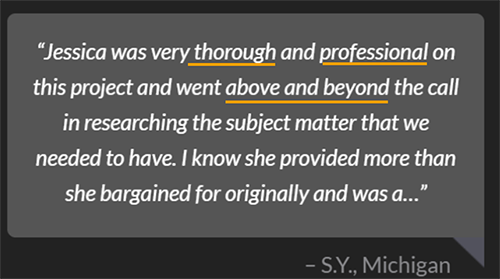
All these testimonials will lend extra credibility and excitement due to their power words and phrases.
10. Using Power Words in Bullet Lists
Many sales pages include a list of benefits of the product they’re selling. Many opt-in forms include a huge list of reasons you should sign up to their email list. And many case studies use bullet lists to quickly summarize information.
You can use power words in these lists to inspire more excitement in your reader as they read through them.
Here’s one example from Ramit Sethi’s sales page for his How to Talk to Anyone course:
And here’s another example from an opt-in form on Restart Your Style:
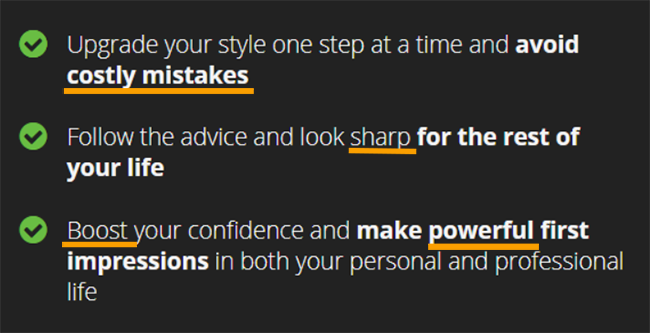
Without these power words, these lists wouldn’t convince nearly as many readers to buy or subscribe.
11. Using Power Words in Button Copy and CTA (Call to Action)
Yep, you can use power words in your button copy too — even if you only have a few words you can fit in there.
One of the most common power words used in buttons is “Free” (as in the example below):

But you can be more creative with buttons than you might think.
Takes this button from the sales page for the book The Renegade Diet:
“Immediate,” “Money Back,” and “Guarantee” are all incredibly powerful words, and the author manages to squeeze them all into one button.
Here’s an example from Tim Ferris:

He could’ve used “Send Me the List” as most people would do, but “Unlock” makes it sound a lot more intriguing — like you’re getting access to something that’s been kept hidden away.
Now take a look at the buttons on your site.
Do you see any opportunities to spruce them up with a power word?
12. Using Power Words in Author Bios
Your author bio is another extremely important part of your marketing.
When you guest post for another blog (or write a paid article as a freelancer), your author bio has the difficult job of making readers want to know more about you so they click through to your site.
That means your author bio needs to spark attention and interest. And you usually only get three sentences, so you need to carefully consider the words you use.
As an example, here’s the author bio from Henneke Duistermaat in her post on overcoming writer’s block:
Henneke’s author bio is full of power words. It shows her uniqueness and makes her stand out from other copywriters.
You can tell she has carefully picked each perfect word for maximum impact.
Here’s another example from Sarah Peterson’s post on blog ads:
She opens strong immediately by mentioning her guides are insanely useful. And just the name of her report alone is full of power words: “Free,” “Reveal,” and “Begging.”
Makes you want to get your hands on that report, doesn’t it?
13. Using Power Words on YouTube Videos
If you’re publishing videos on YouTube and you want to get more views, you should use power words in your titles.
All the biggest YouTube channels do this.
They understand most of their views will come from their subscribers finding them in their feeds, and from people finding them in the sidebar of other videos.
In both cases, you’re competing with many other videos for their attention. If you want your video to stand out and be the one they choose to watch, your title has to be captivating.
See how Philip DeFranco does it below:
“Disgusting,” “Punishment,” and “Controversy” are all attention-grabbing words (and that’s besides the attention-grabbing names of Brock Turner, Star Wars, and Kim Kardashian).
Note also how he has capitalized “Disgusting.” It’s another smart trick many YouTube channels use to stand out more in YouTube’s lists of video suggestions.
Style vlogger Aaron Marino often does it as well:
By capitalizing the power words “Don’ts” and “Stupid,” his title catches a lot more attention (as you can see for yourself by the millions of views it’s received).
14. Using Power Words in Book Titles
If you’re interested in writing your own book, adding power words to your titles will help it sell better.
With all the competition in the book market these days, you need a title that grabs people’s attention and makes them want to peek inside.
Here are a few quick grabs from Amazon’s list of bestsellers in the self-help niche:
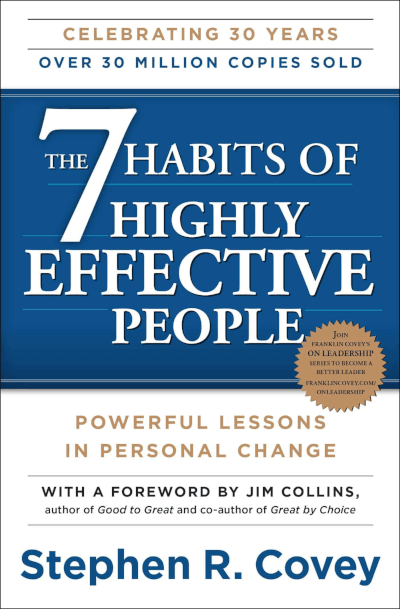
I’m sure you’ve seen this title before.
You might say Stephen Covey’s use of power words in his title has been highly effective. (See what I did there?)
Here’s another:
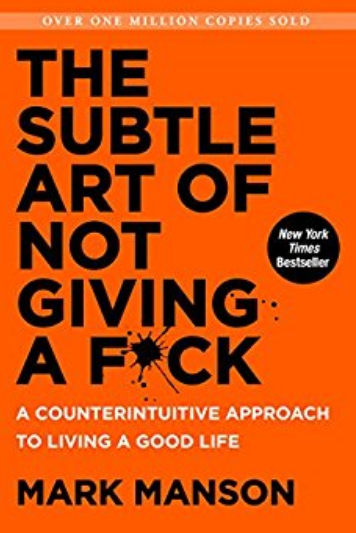
Mark Manson’s bestselling title is packed with power.
The power word “Subtle” juxtaposes well with the F-bomb in the title, and his use of “Counterintuitive” will spark some interest as well.
One more:
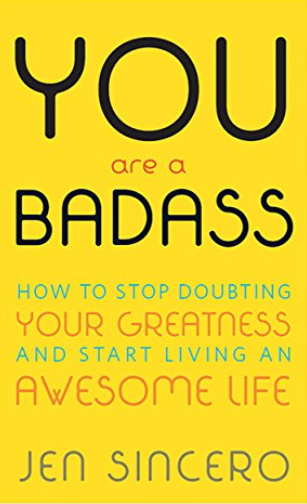
Lastly, Jen Sincero’s encouraging book title makes you want to flip it open and read it in one go.
The use of “Badass” alone will make it stand out in the self-development section, but her use of “Greatness” and “Awesome” in the subtitle truly seals the deal.
Go Ahead and Tell Me. What Powerful Words Did I Miss?
They’re known by many names…
Emotion words. Good words. Strong words. Powerful words, creative words, fancy words, sensory words, trigger words, smart words, feeling words, descriptive words, impactful words, interesting words, positive words, unique words, and even — yes, seriously — awesome words.
But whatever you call them; smart, attractive people such as yourself have mastered the strategic use of power words and use them every day to pack their writing with emotion so they can increase conversions.
Yes, this is an enormous list of words, but with so many power words available, you’d need a thesaurus or Word of the Day dictionary to catch every single word on the first pass. (Plus, new words seem to be added to the English language every day.)
What are some other good words that seem to have that extra little spark of emotion inside them?
Leave your answer in the comments, and as time goes by, I’ll come back periodically and update the power words list. Eventually, I hope to have over 1,000 words here, separated and organized by category, making this the definitive “cheat sheet” of favorite power words on the web.
Thanks in advance for commenting and sharing the post with your friends!
About the Author: Jon Morrow has asked repeatedly to be called “His Royal Awesomeness” but no one listens to him. So, he settles for CEO of Smart Blogger. Poor man. 🙂
The post 600+ Power Words That Pack a Punch and Convert like Crazy appeared first on Smart Blogger.
from
https://smartblogger.com/power-words/












